The Intel Skylake-X Review: Core i9 7900X, i7 7820X and i7 7800X Tested
by Ian Cutress on June 19, 2017 9:01 AM ESTBenchmarking Performance: CPU Encoding Tests
One of the interesting elements on modern processors is encoding performance. This includes encryption/decryption, as well as video transcoding from one video format to another. In the encrypt/decrypt scenario, this remains pertinent to on-the-fly encryption of sensitive data - a process by which more modern devices are leaning to for software security. Video transcoding as a tool to adjust the quality, file size and resolution of a video file has boomed in recent years, such as providing the optimum video for devices before consumption, or for game streamers who are wanting to upload the output from their video camera in real-time. As we move into live 3D video, this task will only get more strenuous, and it turns out that the performance of certain algorithms is a function of the input/output of the content.
HandBrake H264 and HEVC
As mentioned above, video transcoding (both encode and decode) is a hot topic in performance metrics as more and more content is being created. First consideration is the standard in which the video is encoded, which can be lossless or lossy, trade performance for file-size, trade quality for file-size, or all of the above can increase encoding rates to help accelerate decoding rates. Alongside Google's favorite codec, VP9, there are two others that are taking hold: H264, the older codec, is practically everywhere and is designed to be optimized for 1080p video, and HEVC (or H265) that is aimed to provide the same quality as H264 but at a lower file-size (or better quality for the same size). HEVC is important as 4K is streamed over the air, meaning less bits need to be transferred for the same quality content.
Handbrake is a favored tool for transcoding, and so our test regime takes care of three areas.
Low Quality/Resolution H264: He we transcode a 640x266 H264 rip of a 2 hour film, and change the encoding from Main profile to High profile, using the very-fast preset.
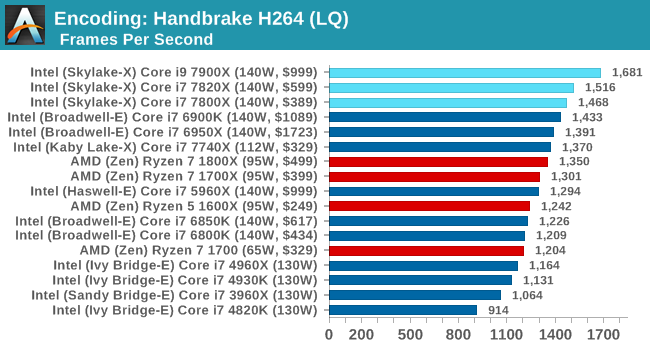
More cores, more frequency, more IPC, more fun: the Core i9-7900X wins here, and even the i7-7800X wins out against the Core i7-6900K.
High Quality/Resolution H264: A similar test, but this time we take a ten-minute double 4K (3840x4320) file running at 60 Hz and transcode from Main to High, using the very-fast preset.
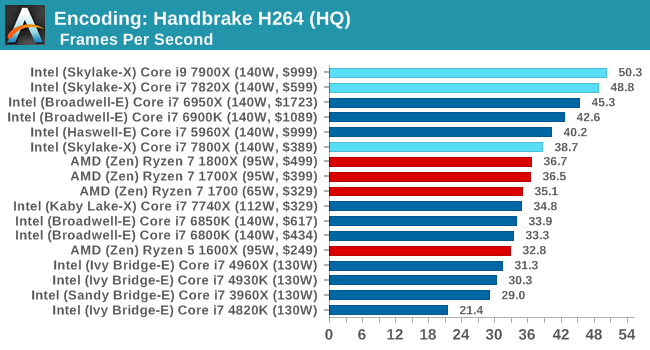
Moving into HQ mode means making the job more parallel, so the higher core counts stay at the top of the chart.
HEVC Test: Using the same video in HQ, we change the resolution and codec of the original video from 4K60 in H264 into 4K60 HEVC.
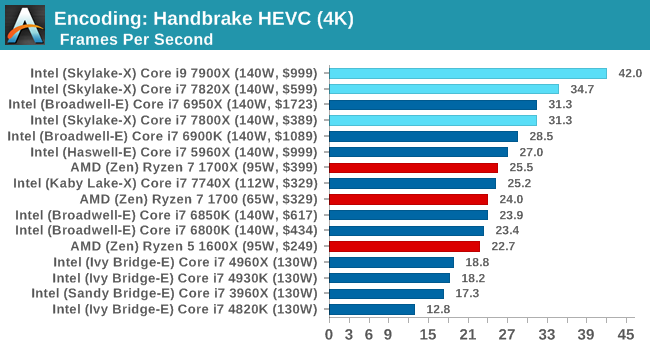
WinRAR 5.40
For the 2017 test suite, we move to the latest version of WinRAR in our compression test. WinRAR in some quarters is more user friendly that 7-Zip, hence its inclusion. Rather than use a benchmark mode as we did with 7-Zip, here we take a set of files representative of a generic stack (33 video files in 1.37 GB, 2834 smaller website files in 370 folders in 150 MB) of compressible and incompressible formats. The results shown are the time taken to encode the file. Due to DRAM caching, we run the test 10 times and take the average of the last five runs when the benchmark is in a steady state.
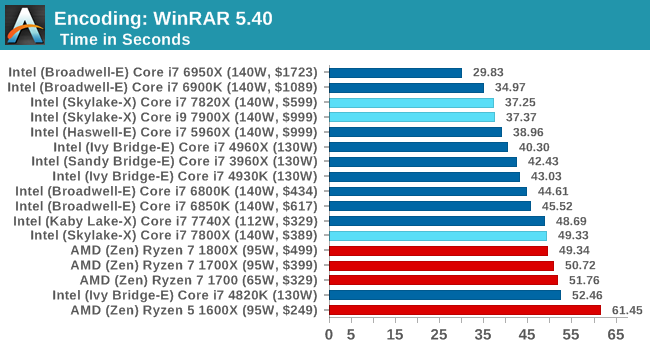
WinRAR loves having access to all the caches as much as possible, to prefetch and store data as needed. The Skylake-X chips fall back a bit here, even with DDR4-2666 support. The Core i7-7800X uses DDR4-2400 memory, so puts it further behind. Interesting didn't realise that the lower core count Broadwell-E chips were affected so much by this test, and the higher core count Ivy Bridge-E parts are faster here.
AES Encoding
Algorithms using AES coding have spread far and wide as a ubiquitous tool for encryption. Again, this is another CPU limited test, and modern CPUs have special AES pathways to accelerate their performance. We often see scaling in both frequency and cores with this benchmark. We use the latest version of TrueCrypt and run its benchmark mode over 1GB of in-DRAM data. Results shown are the GB/s average of encryption and decryption.
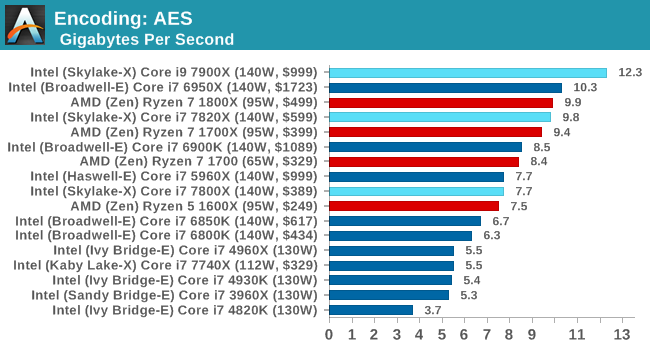
7-Zip
One of the freeware compression tools that offers good scaling performance between processors is 7-Zip. It runs under an open-source licence, is fast, and easy to use tool for power users. We run the benchmark mode via the command line for four loops and take the output score.
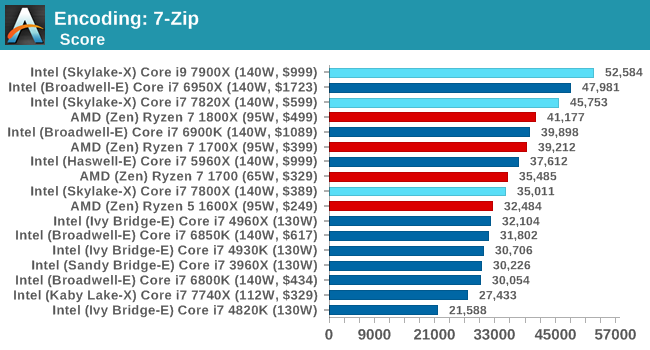










264 Comments
View All Comments
Gothmoth - Tuesday, June 20, 2017 - link
especially in the powerdraw and heat class it dominates even my oven....AntDX316 - Tuesday, June 20, 2017 - link
The new processors are in totally another level/league/class. It dominates in everything and more except a couple benches. If you try to compare by price you can't. It would make no sense.Gothmoth - Tuesday, June 20, 2017 - link
it makes sense.. for everyone except stupid fanboys.Hxx - Tuesday, June 20, 2017 - link
so people are getting pissed because these CPUs perform well albet at a much higher price tag. Sounds like a bunch of AMD fanboys.Its new tech, highest performing, and serving a very niche market. Of course is at a premium price. why wouldn't it be? Luckily, these are not needed for the majority so I am not sure why people get so worked up about it. If you want intel then 7700k is a fantasic $300 CPU. If you want AMD then again the 1700 is also a fantastic CPU. end of story
Gothmoth - Tuesday, June 20, 2017 - link
i personally don´t care about price... my PC´s earn the money back i spend.but saying we can´t compare price/performance form skylake-x and ryzen is just plain stupid.
of course we can.
and we can also compare price/performance when threadripper is released... the real competition to x299.
Gothmoth - Tuesday, June 20, 2017 - link
by the way.. what about the RUMORS that coffee lake will be 6 cores... but no hyperthreading?that would be EXACVTLY what i expect from intel.
Intredpid3d - Tuesday, June 20, 2017 - link
Why did you use Intel's compiler for your reviews? with all the other compilers out there that work beautifully with Ryzen why did you use the one that is known to be deliberately coded to work very badly on anything other than its creators products, Intel.?
johnp_ - Tuesday, June 20, 2017 - link
Were did they use Intel's icc? The Chromium compile test was done using VS Community 2015.3.tamalero - Tuesday, June 20, 2017 - link
Thats the interesting thing, in a lot of reviews online.. there are 3 variations of the same test.1) stock I9 7900
2) optimized compiler I9 7900
3) Oced I9 7900
the optimized one yields like 10% higher on average more performance.
johnp_ - Tuesday, June 20, 2017 - link
2) is not possibly for a Chromium compile test, as that has a hard dependency on Visual Studio 2015 U3 and 3) first requires overclocking, for which they didn't have enough time yet.Regarding higher performance, I expect you mean compiled programs reaching higher performance and not the compilation process requiring less time (which is what anandtech measures here and that's the relevant bit for developers).